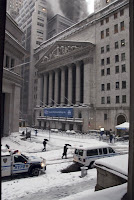 We learned last week that six banks account for nearly 60% of the US GDP, or 60% of all of the money in the US economy.
We learned last week that six banks account for nearly 60% of the US GDP, or 60% of all of the money in the US economy. We also saw that the top 1% of earners in our country generate 20% of all income. Ten years ago, the top 1% generated only 10% of the GDP.
This elite strata used to be filled with business owners and entrepreneurs - from silicon valley whiz kids to pizza tycoons and movie rental moguls. Today, they're almost wholly constituted from financial companies.
 Today's robber barons sit behind glowing green screens and look out on concrete and glass vistas they helped finance. They are money managers, traders, executives, and consultants. They invent things that average people can't understand, like credit default swaps and complex derivatives.
Today's robber barons sit behind glowing green screens and look out on concrete and glass vistas they helped finance. They are money managers, traders, executives, and consultants. They invent things that average people can't understand, like credit default swaps and complex derivatives. They spend more on lobbyists and politicians to keep the slot machines running than the entire GDP of many small countries.
And when it looked like their own reckless arrogance (see credit default swaps and toxic mortgage products) would be their demise, the US borrowed money at the taxpayers' expense to keep them afloat - so that the derivatives could keep coming - unchecked and unregulated - and the roulette wheel could keep spinning, smooth and well-oiled with fiat money.
It has been said that a few years ago, economists and government leaders understood that our financial system (primarily our banking and monetary structure, which include Wall Street and the Federal Reserve) was unstable and unsustainable, and that the US was at a critical juncture.
It was time to make a choice. Start over (as in letting the banks fail) or delay the inevitable by continuing to move jobs overseas - stockpiling profits and manipulating the stock and equities markets.
Alas, they chose wrong.
They could only keep the consumers spending using credit. Certainly not with new or better jobs or increased income. Credit. Mortgages from Freddie and Fannie, easy credit cards, lines of credit, home equity loans. A bubble just waiting to pop.
And at the same time, they turned a blind eye to the export-dumping, currency-suppressing Chinese, who under-consume (because underpaid and oppressed populations can't afford the flat screen televisions they export) within the new global economy. Drive the price of the currency down so that Chinese goods are cheaper than american goods, even if they have to be shipped from the other side of the globe.
Chinese goods, built with Chinese labor, then stamped with the logo of a US company, make their way into retail stores across this country. When they're sold in a retail outlet in Detroit or Columbus they profit no one in Michigan. Or Ohio. Or Illinois. Except the clerk at the register, who gets minimum wage.
With these new profits, banks increased the levels of their own capitalization. They receive federal interest payments on banked capital as an ostensible hedge against future crises. But these payments oddly entice banks to grow even more capital rather lend out money to soon-to-be-laid-off Americans.
And now that capital has grown to 60% of our country's GDP.
Wall street has weapons of mass destruction besides credit default swaps. They are computerized, high frequency, high volume trading programs that execute thousands of stock transactions every second. They use quantum algorithmic formulas based on world news, other markets, insider information, and their own visibility into market orders at certain levels.
And so, each time the stock market plunges and surges, you can be sure that the big banks have been busy pushing the market one way or another. They buy and sell to themselves, affecting huge market swings, now common on a daily basis.
These millions of trades and their immense profit represent the new production line of the once-great american economy. Imagine Henry Ford's amazement that a single quantum-trading computer the size of a Model T's back seat could earn a thousand times more money in a single session than his whole plant could earn in a year. Or ten years.
Is it surprising, then, that the american future seems so dismal? Why would banks lend money to build a new plant in Indiana or Ohio when they can roll that money around in the stock market?
The result is that we have few visionaries and risk-takers. Too few innovations by our best and brightest. And we make little use of the windfall of our vast natural resources.
Main Street is so afflicted by the loss of jobs and confidence and their inability to envision the future that they are on the verge of paralysis. And too inhibited by regulations and taxation.
Local businesses hire local residents. But local businesses are small businesses. And on Main street today they're as uncommon as the horse and buggy. The real small businesses got big-boxed out of the market in the 1980's and 90's - and kicked into the unemployment line.
What's left? The big box job with the plastic name tag? Or the small cubicle in a sea of cubicles; dialing for dollars and competing with colleagues in India?
Thus, the new american employee rides the current of change, channeled now by the ebbs and flows of corporate earnings and losses, of shorts and longs, of market winners and losers.
Wall Street has sat down in the american kitchen, poured itself a cup of coffee, and put its feet up on the table. Its cigar-chewing grin makes you think the news is bad, indeed.



No comments:
Post a Comment